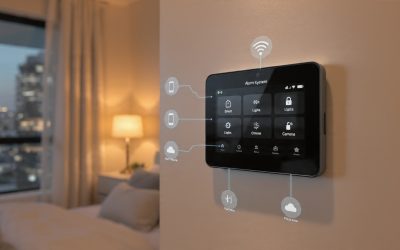Understanding the importance of residential security systems
The safety of one’s family and property is a top priority for many homeowners. In an ever-changing world, the peace of mind that comes with knowing your home is secure cannot be overstated. Residential security systems play a crucial role in maintaining this sense of safety, acting as a first line of defence against potential threats.

A residential security system is not merely an optional add-on but an essential component of modern home safety. These systems provide layered protection that includes intrusion detection, surveillance, and environmental monitoring—each element serving to enhance your home’s overall security.
The role of security systems in home safety
At their core, security systems work to deter crime and protect your loved ones. When intruders see visible security measures—like cameras and alarms—they are often discouraged from attempting to break in. This deterrent effect is vital in reducing the likelihood of a burglary and creating a safer neighbourhood.
Moreover, many security systems also offer features such as motion detection and real-time alerts, keeping you informed of any unusual activity. This proactive approach allows homeowners to respond quickly and effectively in case of any emergencies.
The impact of security systems on property protection
Beyond deterring crime, a well-installed security system significantly decreases the risk of property damage. Intruders often aim for easily accessible homes with no apparent security measures. By integrating a comprehensive security solution, you send a message that your home is not an easy target.
Furthermore, in addition to theft, security systems can also protect your property from environmental factors such as fire and carbon monoxide. When integrated with smoke detectors and gas leak detectors, these systems ensure that you receive immediate alerts, allowing you to take action and potentially save both lives and property.
Different types of residential security systems
When considering a security system for your home, it’s essential to understand the various types available. Each category serves a different purpose and can be tailored to fit specific security needs. The right choice will depend on your particular circumstances and preferences.
Intrusion detection systems
Intrusion detection systems are among the most common types of security systems. They typically include door and window sensors that trigger an alarm when breached. Additionally, some advanced systems offer motion detectors that can identify movement within specific areas of your home.
These systems not only alert you but also notify local authorities in case of a serious breach, effectively increasing your overall safety.
Surveillance camera systems
Surveillance cameras add a visual deterrent to your security measures. Placing cameras at strategic points around your property allows you to monitor activities in real-time or review footage later. Many modern systems offer remote access, so you can check your home while you’re away using your smartphone.
CCTV footage can also serve as valuable evidence in case of a crime, making these systems a key investment for anyone serious about home security solutions.
Fire and smoke detection systems
While we often think of security systems in terms of preventing burglary, fire safety is equally important. Fire and smoke detection systems can be lifesavers, alerting you to smoke or flames long before they become life-threatening.
Modern systems go beyond simple alarms; they can be interconnected with your home security, allowing for comprehensive monitoring and immediate alerts to emergency services.
How residential security systems work
Understanding how these systems operate can help you make an informed decision about your home’s security. The technology behind them can vary, often featuring sophisticated sensors, cameras, and connectivity solutions.
The technology behind security systems
Most residential security systems use a combination of wired and wireless home security technology, allowing for flexible installation options. Sensors typically communicate with a central hub, which manages alerts and notifications. This centralisation simplifies the monitoring of multiple security features from a single interface.
The rise of smart home technology has further revolutionised security systems. Many now integrate seamlessly with other smart devices, enabling homeowners to control security features remotely via apps on their smartphones or tablets.
The process of installing a security system
Installation can vary depending on the type of system you choose. Some homeowners may opt for DIY systems, which are typically easier to install and can save on costs. However, professional installation provides peace of mind, knowing that everything is set up correctly and optimised for your specific home layout.
Regardless of the method chosen, it’s essential to discuss your needs with a security expert who can guide you in customising your system effectively.
The benefits of having a residential security system
The advantages of installing a residential security system are numerous and can significantly enhance your quality of life. Beyond simply protecting your property, these systems offer broader benefits that contribute to overall homeowner satisfaction.
Deterrence of potential intruders
As mentioned earlier, one of the primary benefits is the deterrent effect on potential intruders. When they notice security cameras and alarms, they are less likely to target your home, making your property less vulnerable to theft.
Statistics reveal that homes without security measures are far more likely to be broken into than those equipped with systems. This can give you substantial reassurance regarding the safety of your belongings and loved ones.
Peace of mind for homeowners
Knowing that a reliable security system protects your home can bring you immense peace of mind. Sleep soundly at night, knowing that you have taken proactive measures to ensure the safety of your family and property
Additionally, many systems offer features like automated alerts, allowing you to be informed of any security breaches even from afar. This constant vigilance can significantly alleviate anxiety.
Potential insurance benefits
Homeowners insurance premiums can often be reduced when a home security system is in place. Insurance providers are generally willing to offer lower rates to policyholders who demonstrate a commitment to securing their property.
Before purchasing a system, check with your insurance company to understand how much you could save. This could turn out to be a significant financial benefit in the long run.
Choosing the right security system for your home
The sheer number of options available can be overwhelming when you begin exploring residential security systems. However, with a structured approach, you can find the perfect system that meets your needs.
Assessing your home’s security needs
Start by evaluating your home and identifying vulnerable points that need attention. Consider factors such as location, previous incidents of crime in your area, and your lifestyle. It can also be helpful to ask yourself questions about your specific requirements: do you need indoor cameras, outdoor cameras, or a combination of both?
Comparing different security system providers
Once you have a clear idea of your needs, it’s time to research various security system providers. Look for companies with positive reviews and case studies that align with your expectations. Examine their pricing, services offered, and customer support for further insight.
Don’t hesitate to ask for demonstrations, so you can see the technology in action before making a decision.
Understanding the costs of a security system
The cost of a residential security system can vary widely based on the technology, installation type, and ongoing monitoring services. It’s essential to understand both initial investment and long-term costs when evaluating your options. Sometimes, cheaper systems may lead to higher maintenance and monitoring fees over time.
By carefully considering these factors, you can choose a system that not only fits your budget but also provides the level of security and peace of mind your home deserves.










